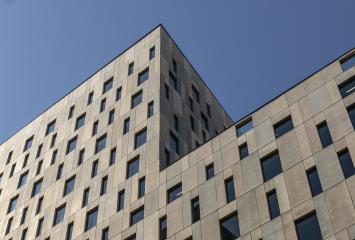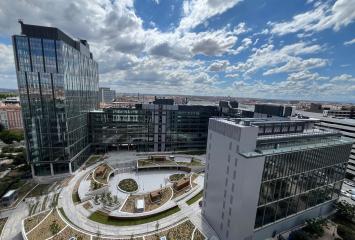Reduction of the carbon footprint: commitment number 2 of Colonial's Sustainability Decalogue
One of the fundamental premises of the Paris Agreement, drafted in the French capital at the end of 2015 and signed in 2016 by 193 independent countries and the entire European Union, is the limitation of the average global temperature increase by 1.5°C compared to that recorded in the pre-industrial era. But public policies are insufficient to achieve this goal. The rest of the social agents, including individuals and companies, must join the initiative. And at Colonial we are doing just that. In fact, reducing our carbon footprint is the second of the commitments in our Sustainability Decalogue. This is how we are working to achieve it:
Measures adopted to reduce the carbon footprint
The construction of office buildings requires materials and energy. And in the vast majority of cases, this double consumption entails a significant production of greenhouse gases, especially carbon dioxide, the most important of them all. To reduce this production, at Colonial we have established an ambitious internal carbon price of 100 euros per ton, which generates greater awareness and motivates much more efficient building actions. The ideals of sustainability are extremely important, but a self-imposed cost overrun further increases the motives for seeking solutions that produce lower CO2 emissions.
However, carbon dioxide emissions do not end with the construction and inauguration of buildings, but extend into their operational phase. And we have also found solutions there: together with Colonial's Sustainability Committee, we have developed carbon footprint control mechanisms such as the installation of more efficient air conditioning systems, the installation of state-of-the-art management systems, the installation of LED lighting or the installation of photovoltaic solar panels. Measures that, as we saw in the first article of this series, also contribute to the reduction of energy intensity.
In addition, and as part of the current decarbonization business plan, at Colonial Group we have approved a series of works to improve energy efficiency and material efficiency that will be addressed over five years and through a dedicated budget of fifty million euros. These works will be closely monitored by the Sustainability Committee, both to ensure that the objectives are achieved and to implement improvements where possible. The idea is to always remain committed to sustainability and in a proactive, never passive, manner. The planet needs our deepest involvement.
Colonial's current carbon footprint status
In 2015 we developed a first decarbonization business plan with very specific targets for 2030. In 2018, however, the good results and the spirit of self-demanding forced us to update those objectives with a second, ambitious strategic plan for carbon neutrality. And the success continues: in 2021, Colonial's asset portfolio experienced a 34% reduction in GHG emissions compared to 2019, making us one of the companies with the lowest carbon footprint intensity ratio in the sector and one of the best positioned to achieve the coveted and necessary CO2 neutrality.
Buildings in Colonial's catalog that exemplify this principle
One of the most important measures of the new decarbonization business plan is the reduction of the carbon footprint in the use of materials. This involves both the selection of less polluting materials and the reduction of energy used during the supply chain. Wittywood, located in one of Barcelona's most promising environments, perfectly exemplifies these efforts, as it is made entirely from massive wood, a material whose production emits far fewer greenhouse gases, as well as having the capacity to fix a large part of the CO2 generated around it.
Diagonal 525, also in Barcelona, also has a high degree of sustainability due precisely to the use of environmentally friendly materials. Hence its LEED Gold certification. Illacuna, for its part, stands out for its technological infrastructure, thanks to which it generates 50% savings in carbon emissions. Torre Marenostrum has eliminated emissions throughout its operational phase. In addition, many of Colonial's properties in Barcelona have a Building Management System, which reduces energy consumption and consequently reduces the carbon footprint.
As for the assets in Madrid, Cedro particularly stands out, which, in addition to energy efficiency measures, is made of both locally sourced and highly recycled materials. Also Alfonso XII 62, which boasts a 59% reduction in its carbon footprint. And MV49 Business Park, which minimizes the consumption of carbon-based energy through its commitment to solar and photovoltaic energy production. Discovery Building or Castellana 163 are also particularly important in our emissions neutrality plans. Investing in sustainability is a priority. And it will continue to be.

